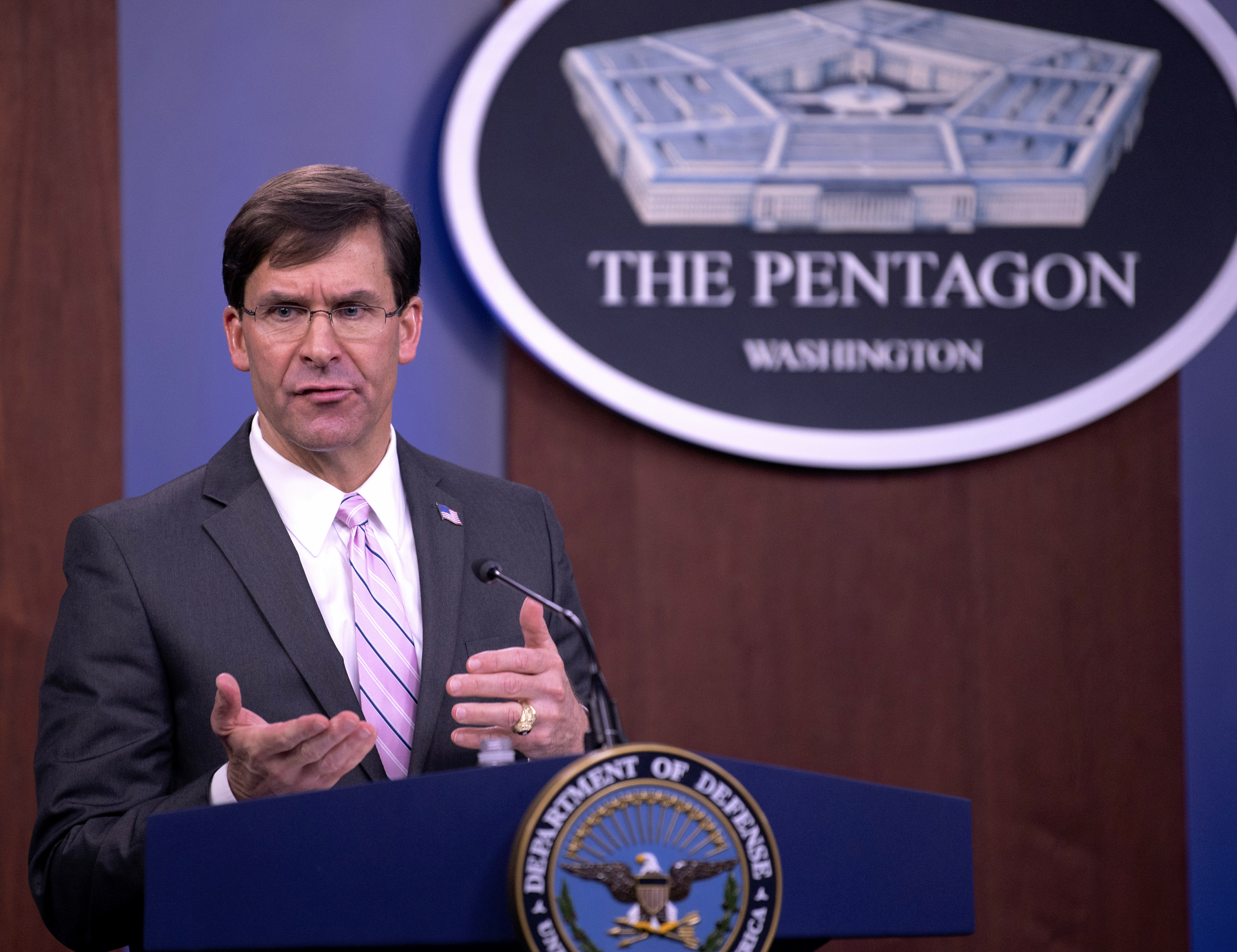
When the bill comes due for Congress to pay off nearly $3 trillion in spending bills passed to spur economic activity during the COVID-19 shutdown, Secretary of Defense Mark Esper worries future Pentagon budgets will take a hit.
For the Department of Defense to continue increasing its readiness and modernize its forces, the Pentagon needs its topline budget to grow between 3 percent and 5 percent annually, Esper said Monday morning during a webinar hosted by the Brookings Institution.
“I am concerned of course that the massive infusion of dollars into the economy by the Congress and the executive branch, nearly $3 trillion, may throw us off that course, if you will, because we all recognize the United States has an enormous debt and we have to deal with that too,” Esper said. “So, there is a concern there that may lead to smaller defense budgets in the future at the critical time we need to continue making this adjustment, where we look at China, then Russia, as our long-term strategic competitors.”
President Donald Trump’s proposed Fiscal Year 2021 Department of Defense budget requested $705.4 billion, which is $7.2 billion less than the DoD spending in FY 2020. Congress is weighing the president’s spending proposal, but it’s too soon to tell the amount of spending Congress will authorize and appropriate.
“Many have raised this concern, that the huge current deficits and a future focus on domestic issues, both the economy and health, will lead to lower defense budgets,” Mark Cancian, a senior advisor for the international security program at the Center for Strategic and International Studies, told USNI News after the webinar. “However, I am something of a contrarian here. Congress has increased the current budget, FY 2020, to fight the pandemic. Congress will likely fund the FY 2021 budget at something close to the request, since I don’t see any near-term interest in fiscal restraint.”
Regardless of the outcome in this November’s presidential election, Cancian said a new administration will propose the FY 2022 budget. If Trump wins a second term, Cancian expects the budget will be flat in real terms, as the projection currently shows.
If the presumptive Democratic nominee Joe Biden wins in November, Cancian doesn’t expect a radical shift spending. A Biden FY 2022 budget proposal would likely cut defense spending by about 5 percent, or $35 billion to be phased in over five years, Cancian said. A Biden administration will likely adopt the same national security strategy as the Obama administration did in its later years, he said, which would require a sizable defense effort.
The Pentagon is investing heavily in more efficient systems, Esper said. This includes developing artificial intelligence, hypersonic weapons and defense systems, space capabilities, cyber and directed energy systems. At the same time, the Pentagon must evaluate which systems to keep.
“That means shedding the legacy force, and moving to a more modern force,” Esper said. “And that more modern force looks like completely revitalized strategic forces — and, as you know, we’re rebuilding all three legs of the nuclear triad, whether it’s the ground-based strategic deterrent, the new SSBNs or long-range strategic bombers.”
The possibility of budget cuts, though, is real, Todd Harrison, the director of defense budget analysis at CSIS, told USNI News after the webinar.
“I think DoD should start preparing for the possibility of a budget downturn,” Harrison said. “It should not repeat the mistakes it made in 2012-2013 in the leadup to the [Budget Control Act] going into effect, where the department refused to plan for the cuts in advance. The argument then was, ‘if we plan for cuts, we make the cuts more likely to happen.’ But the cuts happened anyway because they were driven by concerns over the deficit, not defense. I think the same may be true this time around.”
Esper said the Pentagon is already considering ways it can save money in the event of future budget cuts. Some money-savers may change how operations are conducted but wouldn’t come at the expense of readiness or lethality, he said
An example is developing a concept of immediate reaction forces and contingent reaction forces to respond to global situations, Esper said. This shift does not require a lot of new spending and, in some cases, might save money.
“I want to move much more in the direction of operational deployment as compared to permanently deployed foreign forces,” Esper said. “There are a number of things we can do to keep our adversaries off balance, to improve our own readiness at the same time, that don’t necessarily involve massive infusions of dollars.”





